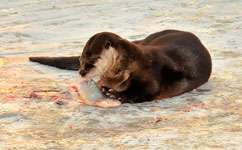Salmon can sniff out predators

Salmon know when their most common predator is around, because they can tell that it's eaten salmon before, new research shows. Young fish can do this too, even if they've never encountered that particular predator before.
Researchers from the University of Swansea put young Atlantic salmon in tanks of water, some sections of which were scented with diluted otter faeces. They found the fish tended to avoid the scented water – provided the otter in question had previously eaten salmon.
"It's the predator's diet – not just its own smell – that's alerting the salmon," explains Dr. Laura Roberts from the University of Swansea, co-author of the report published in Animal Behavior.
Otters are common predators of salmon so it's clearly useful to the fish to be able to sniff them out.
The smell acts as an early-warning system for the fish, even when they can't see the predator. It lets them work out the potential risk of being eaten and balance predator avoidance with other vital activities like foraging and reproducing.
Previous studies have shown that some fish can detect the presence of other predatory fish, but this is the first research to show the mechanism works for mammal predators too.
"We wanted to test whether the salmon were able to recognize the otter as a threat using just chemical cues, and also to see whether they were detecting the smell of the predator's itself or of its diet," says Roberts.
The researchers tested individual fish in a 'Y-maze chamber' – essentially a trough with two arms and a holding tank at one end. This arrangement meant different scents could be released into the arms of the tank and kept separate, while allowing the salmon to swim into whichever arm it chose.
In each test, differently scented water was introduced to each arm of the tank: either unscented, scented with the faeces of an otter that hadn't eaten salmon, or scented with faeces of an otter that had eaten salmon.
The researchers measured the salmons' avoidance behavior by seeing how much time they spent in different parts of the tank. The fish seemed unperturbed by water scented with faeces from the non-salmon eating otter. But when the water was scented by the salmon eater's faeces the fish steered clear, avoiding that arm of the tank around 85 per cent of the time.
The researchers monitored other behaviors associated with predator avoidance, and these also varied depending on the scent. For example, more of the fish rested motionless on the bottom of the tank (known as 'freezing') in the presence of the salmon-diet scent. Fish exposed to this scent also breathed more quickly – a stress response which can be a reaction to the presence of a predator.
This suggests the fish aren't reacting simply to the otter's presence; they are reacting to the smell of an otter that has proved to be a predator by eating other salmon. And this ability gives them a head start in a world where many different creatures are out to eat them.
"The salmon's ability to sense these chemicals helps them react to a wide range of predators without the need to learn about each individual species," says Roberts.
This story is republished courtesy of Planet Earth online, a free, companion website to the award-winning magazine Planet Earth published and funded by the Natural Environment Research Council (NERC).
More information: Laura Jayne Roberts & Carlos Garcia de Leaniz. Something smells fishy: predator-naive salmon use diet cues, not kairomones, to recognize a sympatric mammalian predator. Animal Behavior, 2011, doi: 10.1016/j.anbehav.2011.06.019
Provided by PlanetEarth Online















